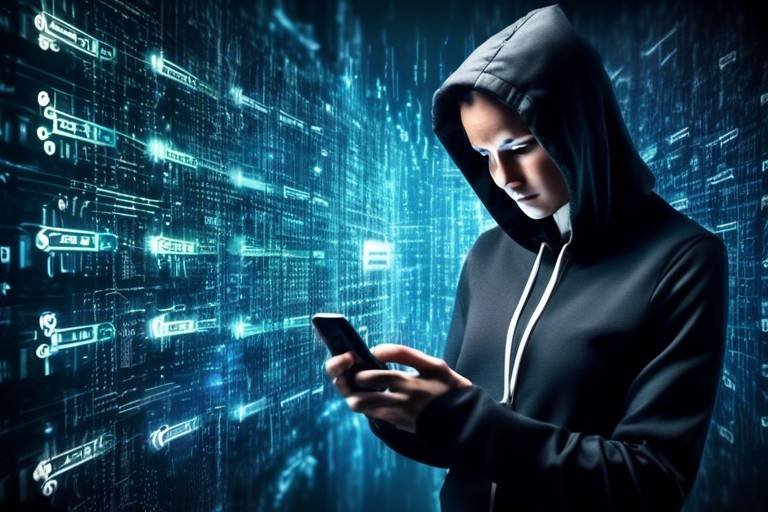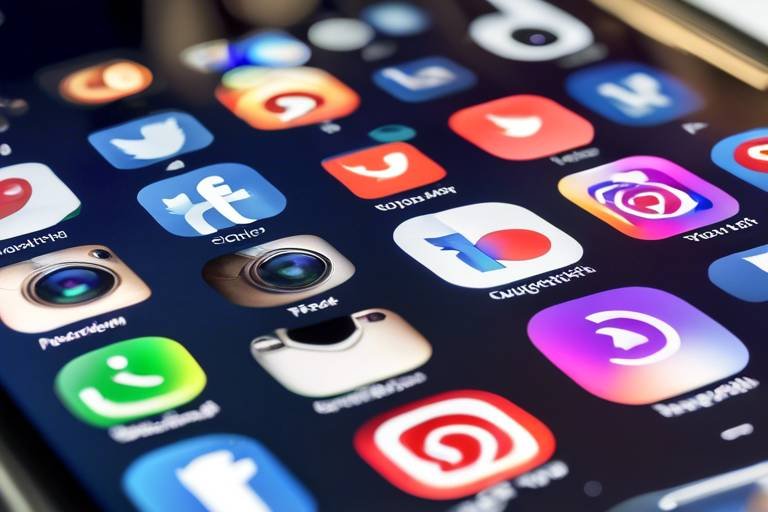What are the Pros and Cons of Public WiFi?
In today's fast-paced digital world, public WiFi has become as common as a cup of coffee. Think about it: you’re at a bustling café, sipping your latte, and you want to check your emails or scroll through social media. What do you do? You connect to the café’s WiFi, of course! But is this convenience worth the potential risks? In this article, we’ll dive deep into the advantages and disadvantages of using public WiFi, helping you navigate the digital landscape with confidence.
Let’s kick things off with the bright side of public WiFi. One of the biggest perks is undoubtedly the convenience. Imagine being able to connect to the internet without burning through your precious mobile data. For travelers or those on a budget, this is a game-changer. You can browse, stream, and communicate without worrying about extra charges. Plus, public WiFi hotspots are often available in popular locations like airports, libraries, and parks, making it easier than ever to stay connected on the go.
Another significant advantage is the accessibility. Public WiFi can bridge the gap for those who may not have reliable internet access at home. It opens up a world of information and resources to everyone, providing opportunities for education, job searching, and social interaction. For many, it’s not just a luxury; it’s a necessity that can facilitate learning and growth.
Now, let’s shift gears and discuss the elephant in the room: security risks. While public WiFi offers many benefits, it also comes with a host of potential dangers. When you connect to an unsecured network, you’re essentially leaving your digital door wide open for hackers. They can easily intercept your data, leading to serious consequences like identity theft or unauthorized access to your accounts. Understanding these risks is crucial if you want to protect your personal information while surfing the web.
Data interception is a significant concern when using public WiFi. Hackers can easily capture sensitive information transmitted over unsecured networks, leading to identity theft or unauthorized access to accounts. Imagine sending an important email or logging into your bank account, only to find out later that someone else has been watching your every move. It’s like leaving your diary open for anyone to read! This is why it’s vital to be aware of your surroundings and the networks you connect to.
So, how can you protect yourself? Implementing protective measures is essential. Here are a few strategies:
- Use a VPN (Virtual Private Network) to encrypt your data.
- Enable two-factor authentication for your accounts.
- Always connect to secured networks when possible.
These precautions can significantly enhance your security and safeguard your personal data when using public WiFi.
Learning to recognize suspicious networks is equally important. Avoid connecting to networks with generic names like "Free WiFi" or those that require unusual login procedures. If it looks too good to be true, it probably is! By being vigilant, you can reduce your chances of falling victim to cybercriminals.
Public WiFi can significantly affect productivity, both positively and negatively. While it provides access to online resources, it can also lead to distractions. Picture this: you sit down to work, but suddenly, you find yourself scrolling through social media instead of tackling that important project. Connectivity issues can also arise, leading to frustration and wasted time. It’s a double-edged sword that requires careful navigation to ensure you’re making the most of your time online.
If you’re concerned about the risks associated with public WiFi, there are several alternatives to consider. Mobile hotspots and private networks can provide a more secure and reliable internet connection. Let’s explore these options further.
Mobile hotspots allow users to create a secure internet connection using their cellular data. This option is often more reliable and safer than public WiFi, especially when traveling. Think of it as your own personal WiFi bubble—secure, private, and always with you!
Utilizing private VPN networks provides an additional layer of security when accessing the internet. VPNs encrypt data, making it difficult for hackers to intercept sensitive information. It’s like having a secret tunnel to the internet, keeping your data safe from prying eyes.
Q1: Is public WiFi safe to use?
A1: While public WiFi can be convenient, it poses several security risks. Always take precautions such as using a VPN and avoiding sensitive transactions.
Q2: What are some signs of a suspicious network?
A2: Look out for generic network names, unusual login procedures, or networks that require personal information to access.
Q3: Are mobile hotspots a good alternative to public WiFi?
A3: Yes! Mobile hotspots provide a more secure and reliable connection, making them a great alternative when you're on the go.

Advantages of Public WiFi
This article explores the advantages and disadvantages of using public WiFi, including security concerns, accessibility, and its impact on productivity. Understanding these factors can help users make informed decisions.
Public WiFi has become a staple in our daily lives, offering a myriad of benefits that cater to the needs of the modern user. One of the most significant advantages is convenience. Imagine you’re at a bustling café, sipping your favorite latte, and you suddenly realize you need to check your emails or upload that important document. With public WiFi, you can easily connect to the internet without relying on your mobile data plan, which is especially appealing for those who are constantly on the go. This accessibility not only saves money but also allows users to stay connected wherever they are.
Moreover, public WiFi is a godsend for travelers. Have you ever found yourself in a foreign city, desperately trying to navigate your way to the nearest attraction? With the availability of free WiFi in airports, hotels, and public spaces, you can access maps, travel guides, and even local recommendations without burning a hole in your wallet. This means you can enjoy your trip without the constant worry of exceeding your mobile data limits.
Another advantage is the collaborative environment that public WiFi fosters. Co-working spaces, libraries, and coffee shops often provide free internet access, creating an atmosphere where individuals can work, brainstorm, and collaborate. This open access can lead to networking opportunities and the sharing of ideas, which can be invaluable for freelancers and entrepreneurs alike. In fact, many people thrive in these dynamic settings, finding inspiration and motivation from the hustle and bustle around them.
However, it’s essential to recognize that while public WiFi has its perks, it also comes with its own set of challenges. But let’s not forget the positives! For instance, public WiFi can be a great way to test out new apps or services without the fear of incurring additional costs. If you’re curious about a new streaming service or want to download a large file, doing so over public WiFi can save you precious data.
To sum it up, the advantages of public WiFi can be categorized as follows:
- Cost Savings: Accessing the internet without data charges.
- Convenience: Easily connect while on the go.
- Collaboration: Fosters networking and teamwork.
- Exploration: Test new apps or services without financial risk.
In conclusion, public WiFi is a double-edged sword. While it offers undeniable benefits, users must remain vigilant about the potential drawbacks. By understanding both sides, individuals can make informed decisions about when and how to utilize public WiFi effectively.
Using public WiFi can expose users to various security threats, including hacking and data breaches. Understanding these risks is crucial for protecting personal information while connected to unsecured networks.
Data interception is a significant concern when using public WiFi. Hackers can easily capture sensitive information transmitted over unsecured networks, leading to identity theft or unauthorized access to accounts.
Implementing protective measures, such as using a VPN or enabling two-factor authentication, can help mitigate the risks associated with public WiFi. These strategies enhance security and safeguard personal data.
Learning to recognize suspicious networks is essential for safe browsing. Users should avoid connecting to networks with generic names or those that require unusual login procedures.
Public WiFi can significantly affect productivity, both positively and negatively. While it provides access to online resources, it can also lead to distractions and connectivity issues.
For those concerned about the risks of public WiFi, several alternatives exist, such as mobile hotspots and private networks. Exploring these options can enhance security and reliability.
Mobile hotspots allow users to create a secure internet connection using their cellular data. This option is often more reliable and safer than public WiFi, especially when traveling.
Utilizing private VPN networks provides an additional layer of security when accessing the internet. VPNs encrypt data, making it difficult for hackers to intercept sensitive information.
Q: Is public WiFi safe to use?
A: While public WiFi offers convenience, it can pose security risks. Always use protective measures like VPNs.
Q: How can I protect my data on public WiFi?
A: Use a VPN, avoid accessing sensitive information, and connect only to trusted networks.
Q: Are there better alternatives to public WiFi?
A: Yes, mobile hotspots and private VPN networks provide more secure internet access.

Security Risks
When it comes to using public WiFi, the allure of free internet access can be tempting, but it’s crucial to understand the that come along with it. Public networks are often less secure than private ones, making them a playground for cybercriminals looking to exploit unsuspecting users. Imagine walking into a crowded café, laptop in hand, and connecting to the WiFi without a second thought. Sounds convenient, right? However, this convenience often comes at a cost—your personal data could be at risk.
One of the most significant threats users face on public WiFi is data interception. This occurs when hackers use various techniques to capture sensitive information transmitted over unsecured networks. For example, when you log into your bank account or enter your credit card details, that information can be intercepted by a malicious actor lurking on the same network. It's as if you're sending a postcard with your personal information written on it—anyone can read it! This can lead to serious consequences, including identity theft and unauthorized access to your accounts.
To illustrate the potential dangers, consider the following statistics:
| Risk | Percentage of Users Affected |
|---|---|
| Data Breaches | 43% |
| Identity Theft | 30% |
| Malware Attacks | 25% |
Understanding these risks is crucial for anyone who frequently connects to public WiFi. To help mitigate these threats, users should implement a few protective measures. For instance, using a Virtual Private Network (VPN) can encrypt your internet traffic, making it much harder for hackers to intercept your data. Additionally, enabling two-factor authentication on your accounts adds an extra layer of security that can help protect your information even if it does fall into the wrong hands.
Another key aspect of staying safe on public WiFi is recognizing suspicious networks. Not all WiFi networks are created equal, and some may be set up specifically to trick users into connecting. Always be cautious of networks with generic names like "Free WiFi" or "Public WiFi," as these could be traps. If a network requires unusual login procedures, such as asking for personal information before granting access, it’s best to steer clear.
In conclusion, while public WiFi offers undeniable convenience, it’s essential to be aware of the security risks involved. By taking proactive steps to protect your data and being vigilant about the networks you connect to, you can enjoy the benefits of public WiFi without falling victim to cyber threats.
- Is it safe to use public WiFi? While it can be convenient, public WiFi is often not secure. It's essential to take protective measures.
- What can I do to protect my data on public WiFi? Use a VPN, enable two-factor authentication, and avoid entering sensitive information.
- How can I recognize a suspicious network? Look out for generic names and unusual login requests. If it seems off, don’t connect.

Data Interception
When you connect to public WiFi, you might feel like you're entering a digital playground, full of opportunities to surf the web, check your emails, or stream your favorite shows. However, lurking beneath this seemingly innocent access is a significant threat known as . This is when hackers, often equipped with sophisticated tools, can capture the data you're sending and receiving over an unsecured network. Imagine sending a postcard through the mail; anyone could read what you wrote. That's similar to what happens when you transmit sensitive information over public WiFi.
Data interception can lead to severe consequences, including identity theft or unauthorized access to your accounts. Hackers can intercept various types of information, such as:
- Login Credentials: Usernames and passwords can be snatched right out of the air.
- Personal Information: Your name, address, and even social security numbers can be easily captured.
- Financial Data: Credit card numbers and banking information are prime targets for cybercriminals.
To illustrate the severity of this issue, consider a study by the Federal Trade Commission (FTC), which reported that nearly 30% of data breaches were due to unsecured WiFi networks. This statistic should raise a red flag for anyone who frequently connects to public networks without taking precautions. The ease with which hackers can access your information is alarming, and it emphasizes the need for vigilance when using public WiFi.
So, how can you protect yourself from data interception while enjoying the conveniences of public WiFi? Here are a few protective measures:
- Use a VPN: A Virtual Private Network encrypts your internet connection, making it much harder for hackers to intercept your data.
- Enable HTTPS: Always check for HTTPS in the URL, as it indicates a secure connection.
- Avoid Sensitive Transactions: Refrain from accessing sensitive accounts or making purchases while on public WiFi.
In conclusion, while public WiFi offers undeniable conveniences, the risks of data interception can be perilous. By being aware of these threats and taking appropriate precautions, you can enjoy the benefits of connectivity without falling victim to cybercrime.
Q: What is data interception?
A: Data interception occurs when unauthorized individuals capture data transmitted over a network, often leading to identity theft and unauthorized access to personal accounts.
Q: How can I protect myself from data interception on public WiFi?
A: You can protect yourself by using a VPN, ensuring you only connect to secure websites (look for HTTPS), and avoiding sensitive transactions while on public networks.
Q: Is public WiFi safe to use?
A: While convenient, public WiFi is generally not safe due to the risk of data interception. It's crucial to take precautions to protect your personal information.
Q: What should I do if I suspect my data has been intercepted?
A: If you suspect your data has been intercepted, change your passwords immediately, monitor your accounts for suspicious activity, and consider contacting your bank or credit card company.

Protective Measures
When it comes to using public WiFi, being aware of is essential. Think of it like wearing a helmet while riding a bike; it may feel unnecessary at times, but it can save you from serious harm. One of the most effective ways to enhance your security is by using a Virtual Private Network (VPN). A VPN encrypts your internet connection, making it incredibly difficult for hackers to intercept your data. It’s like sending your information through a secure tunnel that only you can access. So, whether you're checking emails or shopping online, a VPN can provide peace of mind.
Another important strategy is enabling two-factor authentication (2FA) on your accounts. This extra layer of security requires not only your password but also a second piece of information, usually a code sent to your phone. It’s akin to needing both a key and a fingerprint to unlock a safe. Even if someone manages to steal your password, they won’t be able to access your account without that second factor.
Moreover, it’s vital to recognize suspicious networks. If you see a WiFi network named “Free Public WiFi” or something generic, it's best to steer clear. These networks can often be traps set by hackers. Always opt for networks that require a password and are affiliated with a reputable establishment, like a café or hotel. If you’re unsure, ask the staff for the correct network name and password. Remember, not all free WiFi is created equal!
Lastly, keeping your device’s software up to date is crucial. Software updates often contain security patches that protect against the latest threats. Imagine your device as a fortress; regular updates reinforce the walls, making it harder for intruders to break in. So, always ensure your operating system and applications are current to defend against vulnerabilities.
In summary, while public WiFi can be convenient, it’s essential to take proactive steps to protect yourself. By using a VPN, enabling two-factor authentication, recognizing suspicious networks, and keeping your software updated, you can enjoy the benefits of public WiFi without compromising your security.
- Is it safe to use public WiFi? While public WiFi offers convenience, it comes with security risks. Taking protective measures can help mitigate these risks.
- What is a VPN and why do I need one? A VPN encrypts your internet connection, providing a secure way to browse the web, especially on public networks.
- How can I tell if a WiFi network is secure? Look for networks that require a password and are associated with reputable businesses. Avoid generic names.
- What should I do if I suspect my data has been compromised? Change your passwords immediately, enable two-factor authentication, and monitor your accounts for any suspicious activity.

Recognizing Suspicious Networks
When you're out and about, hopping onto a public WiFi network can feel like a lifesaver—especially when you're trying to avoid those pesky data charges. However, not all networks are created equal, and some can be downright dangerous. Recognizing suspicious networks is crucial for your online safety. Imagine walking into a crowded café and seeing multiple WiFi options. How do you know which one to trust? Here are some key indicators to help you spot a potentially unsafe network.
First and foremost, always be cautious of networks with generic names such as "Free WiFi" or "Public WiFi." These names are often used by hackers to lure unsuspecting users. If a network name seems too basic or lacks any branding, it might be a trap. Additionally, if you encounter a network that requires an unusual login procedure—like asking for personal information or payment details before granting access—it's a red flag. Legitimate public WiFi usually has a straightforward connection process.
Moreover, consider the environment around you. If you're in a location where WiFi is typically available, such as a library or a coffee shop, and you see multiple networks with similar names, be wary. This could indicate that someone is trying to create a fake network to intercept your data. Always connect to the official network, which is often advertised on the establishment's walls or menus.
Another tip? Look for signs of a secure connection. A network that offers a secure login page (with "https://" in the URL) is generally safer than one that does not. If you're unsure, you can take a moment to ask staff members about the correct network to use. They can provide you with the official network name and any necessary passwords.
In summary, being vigilant about the networks you connect to is essential. By keeping an eye out for generic names, unusual login requirements, and verifying with staff, you can significantly reduce the risk of falling victim to cyber threats. Remember, your online safety is paramount, and taking these simple steps can go a long way in protecting your personal information.
- What should I do if I accidentally connect to a suspicious network? If you realize you've connected to a suspicious network, disconnect immediately. Avoid entering any personal information and consider changing your passwords as a precaution.
- Is it safe to use public WiFi for online banking? It's generally not recommended to use public WiFi for sensitive transactions like online banking. If you must, ensure you're using a VPN for added security.
- How can I tell if a network is secure? Look for networks that require a password and have a secure login page (https://). If in doubt, ask the establishment for the correct network name.

Impact on Productivity
Public WiFi can be a double-edged sword when it comes to productivity. On one hand, it offers a convenient way to access the internet while on the go, allowing users to check emails, attend virtual meetings, or browse important information without the constraints of a wired connection. Imagine sitting in a cozy café, sipping your favorite coffee, and effortlessly catching up on work tasks or even brainstorming ideas for your next big project. Sounds great, right? However, it’s not all sunshine and rainbows. Public WiFi can also lead to significant distractions that hamper productivity.
One of the biggest challenges with public WiFi is the inconsistency of the connection. You might find yourself in a bustling airport or a busy park, where the signal fluctuates, making it difficult to stay connected. This can lead to frustrating delays when trying to upload files or participate in video calls. In fact, studies have shown that unreliable internet connections can lead to a 30% decrease in productivity for remote workers. Additionally, the presence of other users on the same network can slow down your connection, which can be incredibly frustrating when you’re trying to meet a deadline.
Moreover, the very nature of public spaces can introduce a myriad of distractions. The sounds of chatter, the sight of people moving around, or even the enticing aroma of baked goods can pull your attention away from your work. This environment can lead to a lack of focus and diminished productivity. To illustrate this point, consider the following table that highlights common distractions faced while using public WiFi:
| Type of Distraction | Impact on Productivity |
|---|---|
| Noise from Surroundings | Can cause difficulty concentrating, leading to decreased output. |
| Visual Distractions | People walking by or activities happening nearby can break your focus. |
| Social Interactions | Engaging with friends or strangers can lead to time lost. |
Despite these challenges, many people find ways to enhance their productivity while using public WiFi. Here are a few strategies:
- Set Clear Goals: Before you log on, outline what you aim to accomplish. This can help keep you focused.
- Use Noise-Canceling Headphones: These can help drown out background noise and improve concentration.
- Limit Social Interactions: Consider using public WiFi in quieter locations or during off-peak hours to minimize distractions.
In summary, while public WiFi can provide essential connectivity and convenience, it also presents challenges that can impact productivity. By recognizing these potential pitfalls and implementing effective strategies, users can make the most of their time spent online in public spaces.

Alternatives to Public WiFi
When it comes to staying connected while on the go, relying solely on public WiFi can feel like walking a tightrope. Sure, it’s convenient, but the risks can outweigh the benefits. So, what are the alternatives? There are several options that not only provide internet access but also enhance your security and reliability. Let's dive into a couple of these alternatives that can keep you connected without the nagging fear of cyber threats.
One popular alternative is using mobile hotspots. These nifty devices allow you to create a secure internet connection using your cellular data. Imagine being able to turn your smartphone or a portable hotspot device into a mini WiFi router! This option is especially appealing for those who travel frequently or work remotely, as it often offers a more reliable and stable connection compared to public networks. Plus, you don’t have to worry about prying eyes trying to intercept your data. Just think of it as your personal bubble of internet safety, keeping unwanted intruders at bay.
Another excellent alternative is utilizing private VPN networks. VPNs, or Virtual Private Networks, are like a cloak of invisibility for your online activities. They encrypt your data, making it incredibly difficult for hackers to intercept sensitive information. This is particularly important when you’re accessing banking information or entering personal details. With a VPN, you can browse the internet with peace of mind, knowing that your data is shielded from prying eyes. It’s like sending your information through a secure tunnel, far away from the dangers lurking on public networks.
Now, you might be wondering about the costs associated with these alternatives. While mobile hotspots often require a data plan, many find the investment worthwhile when considering the enhanced security and reliability. VPN services also come with a subscription fee, but they can vary widely in price depending on the features you choose. Here’s a quick comparison table to help you weigh your options:
| Alternative | Cost | Security Level | Reliability |
|---|---|---|---|
| Mobile Hotspot | Varies (data plan required) | High | High |
| Private VPN | Monthly subscription | Very High | Moderate to High |
Ultimately, the choice between public WiFi, mobile hotspots, and private VPNs boils down to your specific needs and circumstances. If you prioritize security and reliability, investing in a mobile hotspot or VPN can be a game-changer. It’s all about finding the right balance between convenience and safety. So, the next time you find yourself in a café with free WiFi, consider whether it’s worth the potential risks. After all, your digital safety is paramount!
Q: Is it safe to use public WiFi?
A: Public WiFi can expose you to various security risks, including hacking and data breaches. It's advisable to use protective measures such as a VPN.
Q: What is a mobile hotspot?
A: A mobile hotspot is a device that allows you to share your cellular data connection with other devices, providing a secure internet connection.
Q: How does a VPN work?
A: A VPN encrypts your internet connection, making it difficult for anyone to intercept your data. This adds a layer of security when accessing the internet.
Q: Are mobile hotspots expensive?
A: The cost of mobile hotspots depends on the data plan you choose. While there is an investment, many find it worthwhile for the security it offers.
Q: Can I use a VPN on my smartphone?
A: Yes, most VPN services offer applications for smartphones, allowing you to secure your mobile internet connection easily.

Mobile Hotspots
In today's fast-paced world, staying connected is more important than ever, and this is where come into play. A mobile hotspot allows you to share your cellular data connection with other devices, creating a personal WiFi network wherever you are. Imagine being at a bustling café or a crowded airport and having the power to connect your laptop, tablet, and phone without relying on potentially unsafe public WiFi. It's like having your own little internet oasis in a desert of connectivity issues!
One of the most significant advantages of using a mobile hotspot is its security. Unlike public networks, which can be breeding grounds for hackers and data thieves, a mobile hotspot is typically secured by a password that only you control. This means that your sensitive information—like passwords, credit card numbers, and personal messages—are much less likely to fall into the wrong hands. Furthermore, mobile hotspots use encryption protocols that add an extra layer of protection, making it difficult for cybercriminals to intercept your data.
Another key benefit is the reliability of your connection. Public WiFi networks can be notoriously inconsistent, often slowing down during peak hours when everyone is trying to connect. In contrast, a mobile hotspot utilizes your cellular network, which tends to be more stable and faster, especially in urban areas. You can stream videos, download large files, or conduct video calls without the frustration of buffering or dropped connections. It’s like having a personal internet service provider right in your pocket!
However, it’s essential to consider the data limits that come with mobile hotspots. Most cellular plans have a cap on data usage, and exceeding that limit could lead to throttled speeds or additional charges. It’s crucial to monitor your data consumption, especially if you plan to use your hotspot for heavy tasks like streaming or gaming. To help you manage this, many smartphones now come with built-in data usage tracking features that can alert you when you're nearing your limit.
In terms of cost, investing in a mobile hotspot device or using your smartphone as a hotspot can be a very economical choice for frequent travelers or remote workers. While there might be an initial cost for the device, the long-term savings from avoiding public WiFi vulnerabilities and potential data breaches can be invaluable. Plus, many mobile carriers offer plans that include unlimited data for hotspots, which can be a game changer for anyone who needs reliable internet access on the go.
In summary, mobile hotspots offer a secure, reliable, and convenient alternative to public WiFi. They empower users to stay connected without sacrificing safety or quality. So, the next time you're on the go, consider turning your smartphone into a mobile hotspot. It could be the difference between a productive day and a frustrating one!
- What is a mobile hotspot?
A mobile hotspot is a device or feature on a smartphone that allows you to share your cellular data connection with other devices, creating a personal WiFi network. - Is using a mobile hotspot safe?
Yes, mobile hotspots are generally safer than public WiFi because they are secured with a password and utilize encryption protocols. - Can I use my smartphone as a mobile hotspot?
Most modern smartphones have a built-in hotspot feature that can be easily activated in the settings. - Will using a mobile hotspot cost me extra?
It depends on your mobile plan. Some plans include mobile hotspot usage, while others may charge extra or have data limits.

Private VPN Networks
When it comes to safeguarding your online presence, offer a robust solution that many people are turning to. Imagine a protective bubble that shields you from prying eyes while you browse the web. That's essentially what a VPN, or Virtual Private Network, does. By encrypting your internet connection, a VPN makes it extremely difficult for hackers and other malicious entities to intercept your data. This is especially crucial when you’re connected to public WiFi, where the risks of data breaches and hacking are significantly heightened.
Using a private VPN network is like having a secret tunnel to the internet. It reroutes your connection through a secure server, masking your IP address and making your online activities virtually untraceable. This not only enhances your security but also allows you to access content that may be restricted in your location. Think of it as having a VIP pass to the internet, where you can bypass geographical restrictions and enjoy a more open web experience.
However, not all VPNs are created equal. When choosing a VPN service, it’s essential to consider several factors to ensure you get the best protection possible. Here are some key features to look for:
- Strong Encryption: Look for VPNs that offer AES-256 encryption, which is considered military-grade security.
- No-Logs Policy: A reputable VPN should have a strict no-logs policy, meaning they don’t track or store your online activities.
- Speed and Bandwidth= Ensure the VPN provides fast connection speeds and sufficient bandwidth for streaming and downloads.
- Multi-Device Support: Check if the VPN can be used on multiple devices simultaneously, from smartphones to laptops.
In addition to these features, it's worth noting that many VPNs come with user-friendly interfaces that make them easy to navigate, even for those who aren't tech-savvy. Most services offer a one-click connection option, allowing you to secure your connection in seconds. Plus, many VPNs provide dedicated apps for various platforms, ensuring you can protect your data whether you’re on a smartphone, tablet, or computer.
Another significant advantage of using a private VPN network is the ability to connect to servers in different countries. This can be particularly beneficial for travelers who want to access their favorite streaming services while abroad. For instance, if you're in a country where certain websites are blocked, a VPN can help you bypass these restrictions, allowing you to surf the web freely. Just imagine being able to catch up on your favorite shows while sipping coffee in a cozy café, all thanks to your trusty VPN!
In conclusion, investing in a private VPN network is a smart choice for anyone who frequently uses public WiFi or wants to enhance their online privacy. With the right VPN, you can browse the internet with confidence, knowing that your data is secure and your online activities remain private.
Q: What is a VPN?
A VPN, or Virtual Private Network, is a service that creates a secure connection over the internet by encrypting your data and masking your IP address.
Q: Is using a VPN illegal?
No, using a VPN is legal in most countries. However, some countries have restrictions on VPN usage, so it's essential to check local laws.
Q: Can a VPN improve my internet speed?
While a VPN can sometimes slow down your connection due to encryption, it can also improve speed by bypassing bandwidth throttling imposed by your ISP.
Q: Do I need a VPN if I am using public WiFi?
Yes, using a VPN on public WiFi is highly recommended as it provides an extra layer of security against potential cyber threats.
Frequently Asked Questions
- What are the main advantages of using public WiFi?
Public WiFi offers several benefits, including cost savings since you can access the internet without using your mobile data. It's also incredibly convenient for travelers and those who need to stay connected while on the go. Imagine being at a coffee shop, sipping your favorite brew, and having instant access to the internet without worrying about your data plan!
- What security risks should I be aware of when using public WiFi?
Using public WiFi can expose you to various security threats, such as data interception and hacking. Hackers often lurk on unsecured networks, waiting to capture sensitive information like passwords and credit card numbers. It's crucial to be vigilant and take precautions to protect your personal data.
- How can I protect myself when using public WiFi?
To enhance your security while using public WiFi, consider using a VPN (Virtual Private Network) to encrypt your data. Additionally, enabling two-factor authentication on your accounts can provide an extra layer of security. Always be cautious about the networks you connect to, avoiding those with generic names or unusual login requirements.
- Does public WiFi affect productivity?
Yes, public WiFi can impact productivity both positively and negatively. While it provides access to essential online resources, it can also lead to distractions and connectivity issues. Think of it like a double-edged sword; it can help you stay connected, but it can also pull your attention away from important tasks.
- What alternatives exist to public WiFi?
If you're concerned about the risks associated with public WiFi, there are several alternatives. Mobile hotspots allow you to create a secure connection using your cellular data, which is often more reliable. Additionally, using private VPN networks can provide enhanced security, encrypting your data and making it harder for hackers to intercept your information.



















